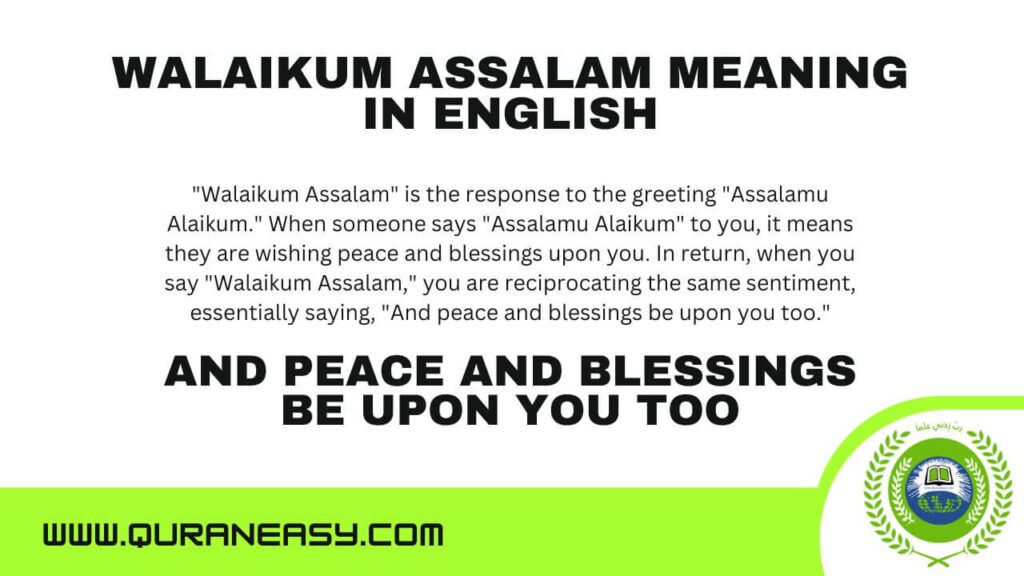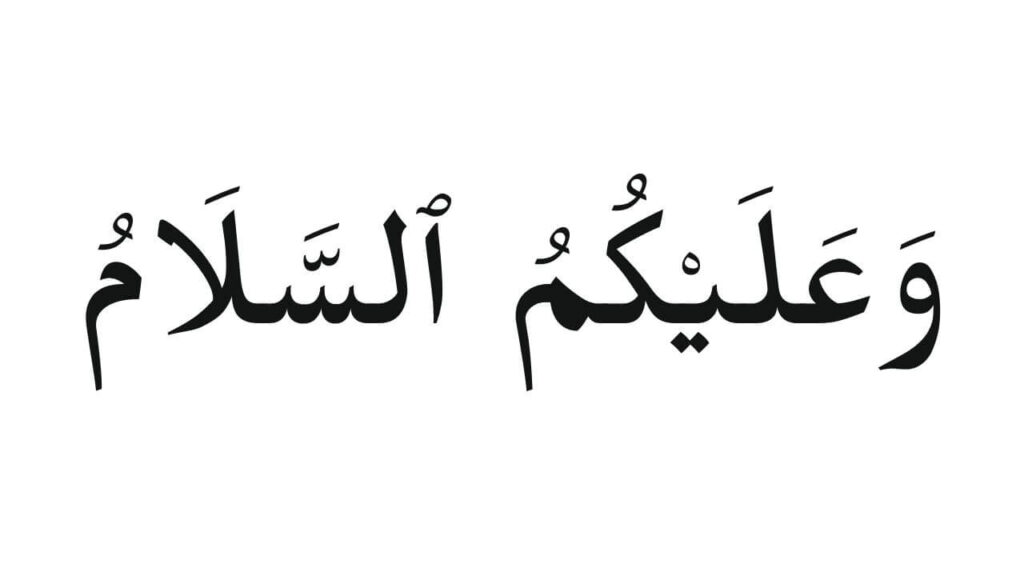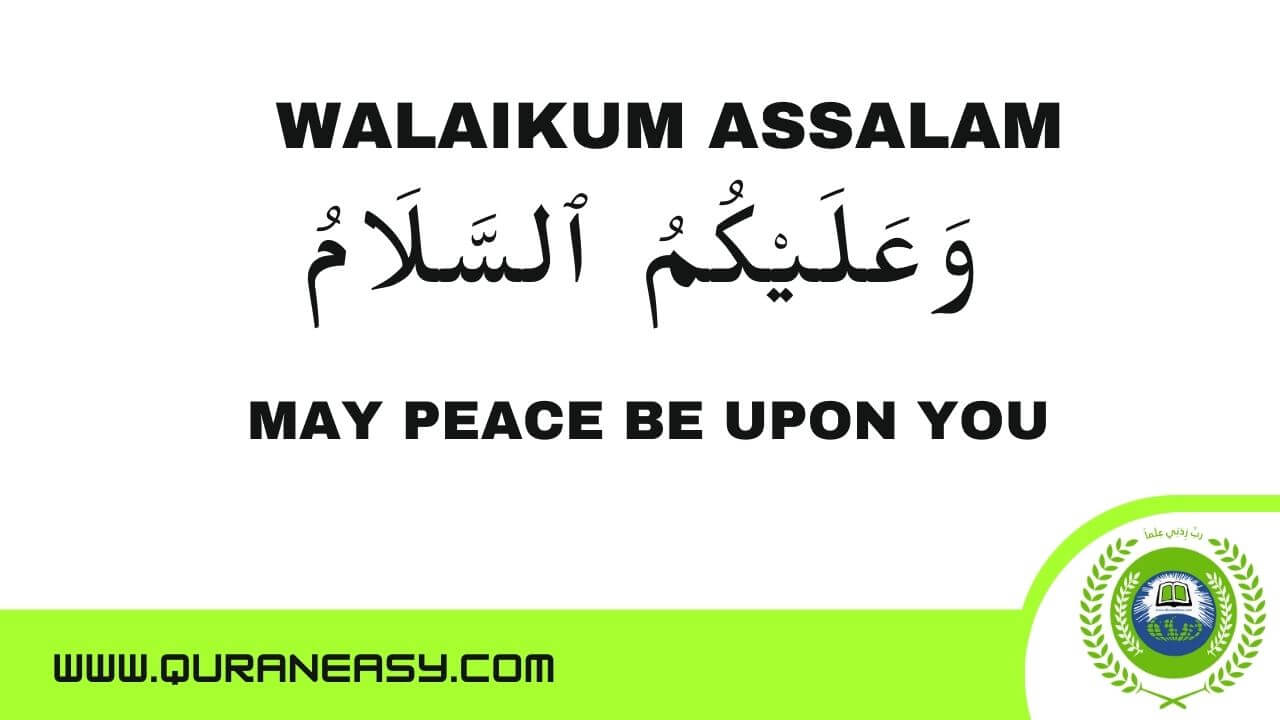In Islam, “Walaikum Assalam” is a commonly used Islamic greeting that holds significant cultural and religious importance. It is often used as a response to the greeting “Assalamu Alaikum,” which means “Peace be upon you.” Together, these greetings convey and promote a sense of peace, harmony, and goodwill among Muslims.
Stay tuned to the rest of the blog to know more about “Walaikum Assalam,” including its pronunciation, meaning, benefits, and cultural context:
Walaikum Assalam Wa’Rahmatullahi Barakatuh Meaning In English

“Walaikum Assalam” is the response to the greeting “Assalamu Alaikum.” When someone says “Assalamu Alaikum” to you, it means they are wishing peace and blessings upon you. In return, when you say “Walaikum Assalam,” you are reciprocating the same sentiment, essentially saying, “And peace and blessings be upon you too.”
Wa Alaikum Salaam is said in 3 versions:
- Waalaikumussalam: “Peace be upon you.”
- Waalaikumsalam Warahmatullahi: “Peace be upon you and Allah’s mercy.”
- Waalaikumsalam Warahmatullahi Wabarakatuh: “Peace be upon you, Allah’s mercy, and blessings.”
Walaikum Assalam In Arabic
“Wa Alaikum Salaam” is a common Arabic greeting that means “And upon you be peace.” In Arabic script, it is written as:
- Wa Alaikum Salaam: وَعَلَيْكُمُ ٱلسَّلَامُ
- Waalaikumsalam Warahmatullahi: وَعَلَيْكُمُ السَّلَامُ وَرَحْمَةُ اللَّهِ
- Waalaikumsalam Warahmatullahi Wabarakatuh: وَعَلَيْكُمُ السَّلَامُ وَرَحْمَةُ اللَّهِ وَبَرَكَاتُهُ
The Wa Alaikum Salaam short form (وعليكم السلام) is a common and concise way of offering the greeting, while the long version includes additional phrases that convey blessings and mercy. All versions are used interchangeably in various situations.
You have to learn arabic quran for better undersanding with this Quran course for kids.

Walaikum Assalam Pronounciation
The exchange of greetings often occurs during Muslim sermons and lectures, where the complete expression goes as follows: Wa ʿalaykumu s-salāmu wa-raḥmatu -llāhi wa-barakātuhū, (وَعَلَيْكُمُ ٱلسَّلَامُ وَرَحْمَةُ ٱللَّٰهِ وَبَرَكَاتُهُ) (May peace, God’s mercy, and His blessings be upon you).
How To Spell Walaikum Assalam Correctly?
Both “Wa alaikum as-salam” and “Walaikum salam” are valid responses to the Islamic greeting “Assalamu alaikum.” The former is a formal and traditional expression, while the latter is a modern and widely accepted variant. Both convey the same message, which is “And peace be upon you too.”

Wa Alaikum Salaam Rahmatullahi Barakatuh Importance In The Light Of Quran And Hadith
In the eye of Islamic teachings found in the Quran and Hadith, one fundamental aspect of human interaction shines brightly: the importance of positive greetings. Today, in the era of fast-paced world, simple greetings like “Waalaikumsalam” or “May peace and blessings be upon you” can mean a lot more than just words. They’re like small gifts of kindness.
When we as muslims say them, we’re not just saying hi; we’re wishing good things for the other person; like peace and blessings. It’s a way to show respect and care.
First Impressions Matter
The Quran reminds us that first impressions matter. We only have the opportunity to make a first impression once, and thus, the way we greet another person carries great weight.
In Surah An Nisa (4:86), a verse resonates with timeless wisdom:
“And when you are greeted with a salutation, greet with one better than it, or return the same.”
Quranic Guidance and Respectful Responses
The Quranic teaching encourages believers to answer to greetings with kindness and respect. It is a practice deeply rooted in Islamic tradition. When someone extends a greeting, the Quran encourages us to reply in kind, or even better.
For instance, when greeted with “Assalamualaikum” or “Salaam,” the appropriate response is “Wa alaykumu as-salam.” If the greeting is extended to “Assalamualaikum Warahmatullahi Wabarakatuh,” the response should be equally generous: “Wa alaykumu as-salam Warahmatullah Wabarakaatuh.”
Surah Noor (24:61): Blessings of Peace
Surah Noor (24:61) further explains the importance of greetings in Islam:
“In Surah Noor ayat 61, it says “There is no blame upon you whether you eat together or separately. But when you enter houses, give greetings of peace upon each other – a greeting from Allah, blessed and good. Thus does Allah make clear to you the verses [of ordinance] that you may understand.”
This verse highlights that exchanging greetings of peace is not merely a social courtesy but a practice blessed by Allah Himself.
Walaikum Assalam And Prophet Muhammad (Peace Be Upon Him)
Prophet Muhammed (ﷺ) said:
“This is Jibril (Gabriel) who is conveying you greetings of peace.” I responded: “Wa ‘Alaihis-Salamu wa Rahmatullahi wa Barakatuhu” [Sunan Ibn Majah]
In the context of the mentioned hadith where the Angel Gabriel greeted Prophet Muhammad with peace, saying “Walaikum Assalam” (peace be upon you too) is important because it shows how we should address to kindness with kindness.
It reminds us of the importance of spreading peace and goodwill in our interactions. This response also reflects a spiritual aspect, as it invokes God’s blessings and peace. Overall, it emphasizes Islam’s core value of promoting peace and harmony in our personal relationships and in the world around us.
Promotion of Good Values
These teachings reflect the broader message of the Quran and Hadith, which serve as guides for good values and ethics. Positive and respectful interactions, such as exchanging greetings of peace, are integral to living a virtuous and fulfilling life in accordance with Islamic principles.
Islam encourages its followers to be mindful of their words and actions, fostering an atmosphere of kindness, respect, and harmony.
How Do Muslims Greet Each Other?
Muslims greet each other with greetings that convey peace and blessings. The most common Islamic greeting is “Assalamu alaikum,” which means “peace be upon you.” Here’s how it is used in daily life:
First Person: One person initiates the greeting with “Assalamu alaikum.”
Responder: The person being greeted responds with “Wa alaikum assalam,” which means “and upon you be peace.”
The greeting reflects a desire for peace and blessings upon both individuals. Muslims may also use a more extended version: “Assalamu alaikum wa rahmatullahi wa baraktuh,” which includes wishes for God’s mercy and blessings.
Benefits Of Walaikum Assalam
When muslims greet each other and initiate their talk with assalamualaikum and follow it up with “Wa-Alaikum Assalam”
1. Continuing the Chain of Salaam
Accepting the greeting with “Wa-Alaikum Assalam” continues the tradition of Salaam, which is a fundamental Islamic practice.
This welcoming greetings not only acknowledges one another’s presence but also strengthens the bonds of brotherhood and sisterhood among believers, emphasizing the importance of mutual respect and love within the Muslim community.
2. Purifying the Soul through Salaam
Our Prophet (Peace Be Upon Him) said:
“When two Muslims meet (give salaam), and shake hands, they are forgiven their sins before they part (with each other)”(Abu Dawud). So we can say that As-Salaamu Alaikum is a source of getting rid of sins.
As indicated by the hadith, when Muslims exchange Salaam, they are forgiven their sins because by saying it, you seek forgiveness from Allah for any sins you may have committed, as per the teachings of the Prophet Muhammad (SAW).
Thus, replying with “Wa-Alaikum Assalam” is a source of purification for the soul and a means of getting rid of sins.
3. Creating a Peaceful Environment
Islam promotes harmony and peace among Muslims by responding with “Wa-Alaikum Assalam. The mutual greetings serves as a reminder to maintain a peaceful and tranquil atmosphere in the community. When individuals answer with kindness and prayers for peace, it helps to diffuse any potential conflicts or tensions that may arise during interactions.
Furthermore, the use of Salaam reinforces the importance of manners and courtesy in Islamic culture. It encourages individuals to approach each other with respect, humility, and good intentions, fostering an environment of mutual understanding and cooperation.
4. Acknowledging Good Wishes
It’s a way of accepting and acknowledging the good wishes and blessings offered by the person who greeted you. In essence, replying with “Wa-Alaikum Assalam” reflects the sincerity and goodwill that should exist among Muslims.
It’s a reminder to always approach interactions with positive intentions and prayers for one another’s well-being. This practice strengthens the social bonds within the Muslim community and encourages the spread of positivity, love, and blessings among fellow believers, emphasizing the importance of mutual support and goodwill in both words and actions.
5. Embracing the Greeting of Jannah
In Holy Quran, Allah Almighty says:
“Then, those that feared their Lord shall be driven in companies into Paradise. When they draw near its gates will be opened, and its keepers will say to them: “Salaamu ‘Alaikum”, you have done well. Enter and live in it forever.”(Quran, 39:73)
The Quranic verse (39:73) reveals that in Paradise, the keepers will greet the inhabitants with “Salaamu ‘Alaikum,” signifying that Salaam is not only a practice on Earth but also the greeting of the people of Jannah. By using it, you align yourself with the blessed inhabitants of Paradise.
Wrapping Up
In simple terms, “Walaikum Assalam” is a special greeting in Islam that means “peace be upon you.” It’s a way to spread kindness and blessings.
When you reply with “Wa-Alaikum Assalam,” you’re keeping the tradition of peace alive, creating a peaceful atmosphere, and showing respect and goodwill. It’s a beautiful way to connect with others in a positive and meaningful way.





Leave A Comment